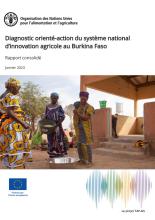Land Library
Bienvenue dans la bibliothèque du Land Portal. Explorez notre vaste collection de ressources en libre accès (plus de 74 000), comprenant des rapports, des articles scientifiques, des articles de recherche, des publications évaluées par des pairs, des documents juridiques, des vidéos et bien plus encore.
/ library resources
Showing items 1 through 9 of 136.Le diagnostic orienté-action du système national d'innovation agricole au Burkina Faso a été conduit conjointement par la FAO et le Ministère en charge de l'agriculture dans le but d'éclairer l'action politique à court terme tout en proposant un cadre stratégique global et de long terme pour renf
Au Maroc, les politiques foncières post indépendance de 1956 ont abouti dans la zone occupée par la France à la mise sous tutelle d’une partie du foncier récupéré de la colonisation officielle et privée (DPE), au maintien du régime des terres collectives codifié dès 1919 par les autorités colonia
Context and backgroundIn 2017 Mali developed a law recognizing the customary land rights of local populations called the "Loi sur le Foncier Agricole" (LFA, Farmland Land Law).
Exploration De La Technologie Blockchain Pour Le Secteur Foncier
Context and backgroundDespite a social recomposition marked by the abolition of slavery and the emancipation of the layers of servile origin, access to land ownership rights for descendants of servile origin is far from guaranteed in Mauritania.
Context and backgroundThe land is a finite resource for which competition is intensifying due to rapid urbanization, population growth, economic necessities... In Morocco, the land is increasingly seen as an obstacle and a major constraint on several levels. .
In Africa, particularly in Senegal, the issue of gender in land governance remains an equation when it comes to access to land.
African cities are characterized by urbanization, social and economic problems that very often favor crises in the development of their spaces. The city of Bouake, in the center of Côte d'Ivoire, has been experiencing urban sprawl since 1980.
Context and Background:Women represent close to 51% of the Cameroonian population and they are more than 70% active in food and market gardening activities (INS, 2010).



